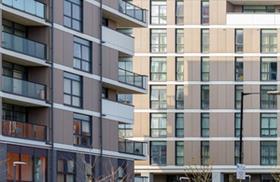Local authorities will have to recover costs from the building's owner

Local authorities have been given the power to remove and replace unsafe cladding on private buildings as the government brings in its ban on combustible materials on new high-rise homes.
Regulations have been laid in parliament today (29 November) which give legal effect to the combustible materials ban that was announced in the summer.
The ban means combustible materials will not be permitted on the external walls of new buildings over 18m high containing flats, as well as new hospitals, residential care premises, dormitories in boarding schools and student accommodation over 18m.
Schools over 18m in height which are built as part of the government’s centrally delivered build programmes will also not use combustible materials, in line with the terms of the ban, in the external wall.
Housing secretary James Brokenshire also revealed the government was stepping in to speed up the replacement of unsafe ACM cladding on private towers.
He said local authorities will get the government’s full backing, including financial support if necessary, to enable them to carry out emergency work on affected private residential buildings with unsafe ACM cladding.
Local authorities will then be required to recover the costs from building owners.
Brokenshire said: "Everyone has a right to feel safe in their homes and I have repeatedly made clear that building owners and developers must replace dangerous ACM cladding. And the costs must not be passed on to leaseholders.
"My message is clear. Private building owners must pay for this work now or they should expect to pay more later."
The government is already fully funding the replacement of unsafe ACM cladding on social sector buildings above 18m.


























No comments yet